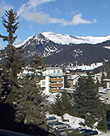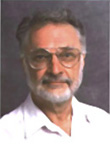 |

Lab Development Plan
Strives for Modernization
By Katlyn Carter
As the clash over the development of Memorial Stadium continues on campus, Berkeley Lab released its own draft long-range development plan Monday. According to the plan, 62 percent of the buildings on the lab’s campus are currently more than 40 years old and 17 percent of the current building square footage is deemed extremely dangerous under current seismic codes. The lab has proposed to demolish up to 320,000 gross square feet of building space that is currently occupied but, according a lab statement, may be too old to be repaired. In addition to the need for safe facilities, the report highlights the current lack of modern spaces to conduct multidisciplinary research and house advanced technological research tools. Full story.

Climate Change Focus
Of World Economic Forum
|
|
|
|
 |
 |
|
|
Davos, Switzerland |
|
|
|
A dearth of snow threatened to make this year’s annual meeting of the World Economic Forum in Davos, Switzerland the greenest ever, but a storm covered the town with a fresh layer of white yesterday as participants started discussing global warming and climate change. About 2,400 business and political leaders, journalists, bloggers and celebrities, 24 heads of state, and scientists like Berkeley Lab Director Steve Chu, are meeting at the five-day annual gathering to talk politics, economics and social issues in an atmosphere aimed at finding long-term solutions instead of quick fixes. Full story.

Ride Ion Train From
The Moon to Earth
By Kelly Young
|
|
|
|
 |
 |
|
|
Brown |
|
|
|
Spacecraft could one day be propelled by ion beams shooting up from the Moon, according to a recent study. Other spacecraft have flown with ion engines, which work by stripping electrons off gas atoms and accelerating the ions with an electric field. The ions create thrust as they are shot out of the engine. The idea behind the new study is to rip out the engine and mount it on the ground, beaming ions up to the spacecraft. "This first look at the idea seems to indicate that it is, in principle, feasible," says Ian Brown, a retired physicist from Berkeley Lab. Full story.
|
 |

